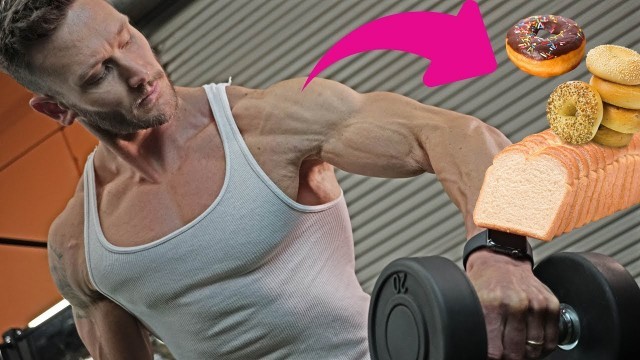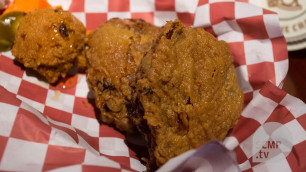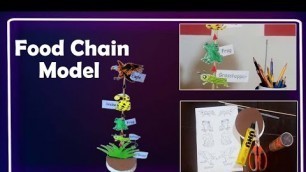

'Click Here to Subscribe: http://Bit.ly/ThomasVid Website: http://ThomasDeLauer.com Get the Apparel I Wear at www.http://Hylete.com Workout Performance vs. Energy Storage | Glycogen Depletion During Exercise (Carb Depletion)… Phosphorylated glycogen phosphorylase is active and catalyzes breakdown of glycogen to glucose 1-phosphate. Breakdown of glycogen involves: 1) Release of glucose-1-phosphate (G1P), 2) rearranging the remaining glycogen (as necessary) to permit continued breakdown, and 3) conversion of G1P to G6P for further metabolism. Remember that G6P can be 1) broken down in glycolysis, 2) converted to glucose by gluconeogenesis, and 3) oxidized (in the pentose phosphate pathway) *Skeletal muscles mainly express beta2-adrenergic receptors and adrenaline, rather than noradrenaline, stimulates glycogen breakdown* Glucose is part of this cycle in that it is broken down into pyruvate to feed into the Kreb\'s cycle. IIRC, one molecule of glucose can provide somewhere around 24 net molecules of ATP - it is the glycogen that is broken apart to provide the glucose. Once your muscle stores of glycogen start being depleted, your body converts blood sugar (glucose) into glycogen in the muscle being depleted. Your muscles will still get glycogen, just not from other muscles (however, your body is not very good at rapidly converting glucose to glycogen) It’s been shown in studies, like one published in the journal Frontiers in Physiology, that cross-country skiing mainly depletes glycogen stores in arms, compared to that of the legs. https://www.ncbi.nlm.nih.gov/pmc/articles/PMC3248697/ Interestingly, the link between glycogen depletion and impaired muscle function during fatigue is not well understood and a direct cause-and-effect relationship between glycogen and muscle function remains to be established. Energy consumption at rest is low; oxygen uptake at rest is typically ∼0.25 L O2 and carb oxidation is ∼0.1 g min−1, and the rate of carb oxidation gradually decreases during fasting* However, humans do not show major decrease in muscle glycogen content during fasting - in contrast, the liver glycogen content decreases rapidly during fasting and the liver glycogen content has decreased by ∼65% after 24 h fasting. So, why is the majority of glycogen stored in muscles? It’s believed that the main function of skeletal muscle glycogen, from an evolutionary point of view, is to serve as an energy store in “fight or flight” situations. In the heart and the brain, glycogen is also the energy substrate that can generate anaerobic energy during short-term oxygen deficiency contributing to survival. References: 1) The Role of Skeletal Muscle Glycogen Breakdown for Regulation of Insulin Sensitivity by Exercise. (n.d.). Retrieved from https://www.ncbi.nlm.nih.gov/pmc/articles/PMC3248697/ 2) Ørtenblad N , et al. (n.d.). Role of glycogen availability in sarcoplasmic reticulum Ca2+ kinetics in human skeletal muscle. - PubMed - NCBI. Retrieved from https://www.ncbi.nlm.nih.gov/pubmed/21135051/ 3) Glycogen Biosynthesis; Glycogen Breakdown. (n.d.). Retrieved from https://oregonstate.edu/instruct/bb450/summer09/lecture/glycogennotes.html 4) Muscle glycogen stores and fatigue. (15, September). Retrieved from https://www.ncbi.nlm.nih.gov/pmc/articles/PMC3784189/ 5) Glycogen Metabolism - Biochemistry - NCBI Bookshelf. (n.d.). Retrieved from https://www.ncbi.nlm.nih.gov/books/NBK21190/ 6) Role of glycogen availability in sarcoplasmic reticulum Ca2+ kinetics in human skeletal muscle. (1, February). Retrieved from https://www.ncbi.nlm.nih.gov/pmc/articles/PMC3055553/ 7) Human skeletal muscle glycogen utilization in exhaustive exercise: role of subcellular localization and fibre type. (1). Retrieved from https://www.ncbi.nlm.nih.gov/pmc/articles/PMC3112561/'
Tags: Weight loss , intermittent fasting , keto , keto diet , Thomas DeLauer , fasting , glycogen , carb depletion , energy storage , carbs and muscle growth , glycogen depletion , Workout performance , carb depletion bodybuilding , do you pull glycogen from the muscle you're using , do you use carbs for specific muscles , carbs and bodybuilding , carbs and glycogen , glycogen and muscle growth , glycogen and fat loss , glycogen and exercise , glycogen and weight lifting , workouts and glycogen
See also:

















comments